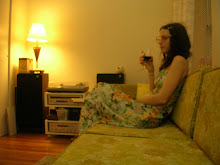we had a four day weekend and decided to take a trip somewhere nearby Beijing for a night. we'd read about an old village still lived in where everything was made of stone. so we left early Friday morning. we took an express train to the capitol of the the province that surrounds Beijing; it took only two hours to get there. it was one of the nicest trains we've been on in china. our tickets were a bit pricey by Chinese standards, but were the only ones we were able to get so last minute.

at the train station--people waiting to get on another train...(each door was similarly crowded)

en route in our very comfortable seats

from the train window

every time i leave Beijing, china feels much more like china. it's easy to get comfortable here. we took a city bus to another part of the city and waited in a long line to buy bus tickets. then realized that the time printed on our tickets to depart wasn't for four more hours. as we stood there trying to decide what to do a woman quickly came up to us, looked at our tickets, and told us to hurry outside and get on a bus. the station was disorganized, no one else seemed to know where to go either, but we were herded onto a mini bus. we realized Beijing had made us used to schedules and organization, but things like that always happen when you travel around china. after an hour or so we arrived at the next town where we needed to catch one more bus to the village. it's interesting that even just a few hours from Beijing people are so unaccustomed to seeing foreigners. people stood and stared at us in the streets, friends whispered to each other to look when they noticed us, a few people called 'hello'! and laughed, two teenagers asked if they could take their photo with us, and all around us we heard the familiar words "laowai" or "waiguoren" (foreigners) on everyone's lips.
the next bus was crowded and hot. we sat in traffic a long time and then pulled off the road for another long wait for another bus to give them some of our passengers. but once we started moving the trip was fine. the area around Beijing is brown and dusty with only small small gnarled trees and scrub grass. much of the way was over dusty dirt roads. it had been awhile since I'd taken a minibus in china, and we were reminded of some of the things that makes them interesting. there's usually about 15 seats and an aisle for standing passengers. the ticket taker is the boss and often tells people where to sit. the woman on our bus was friendly, but also pretty intense as i guess you'd have to be. an argument broke out about the price of the ticket with one passenger and she wasn't someone I'd like to argue with. (she actually smacked him a few times at one point).
people wait along the road for a minibus to come by and it seems there's always room for more. on our trip back after the weekend, as aaron and i were sitting at the front of the bus over the engine, we counted 30 people though there were only 15 seats. soon after our bus slowed down by a small crowd along the road. i thought there's no possible way we can fit that many people in, but somehow we did, until we had 48 adults and a few children packed in. it's really impressive how unaffected people seem by it. no one seems annoyed, no one really complains.
another thing we were reminded of was the creative ways the bus operators get around the safety regulations. at one point when there were only a few standing passengers they told them to get down. they all squatted low on the floor and we drove by a police car stopped in the road. at a road check point our driver gave the checkpoint guy a cigarette and we drove on. i remembered how last time in china, traveling around Xi'an, the minibuses would often pull off to the side of the road, all the standing passengers would be hurried off the bus, and we would continue through the checkpoint without them. (the checkpoints were usually a guy at a desk along the side of the road who would stamp a paper and give it to the bus operator if they passed.) then we'd drive a little ways beyond the checkpoint, and stop to wait for the other passengers to catch up. sometimes they'd walk across, and sometimes a pack of motorcycle drivers would be waiting along the road to drive them across. then the bus driver would pay the motorcyclists and we'd go on our way.
anyway, we arrived in the village and spent the afternoon wandering around the narrow stone alleyways. there were some Chinese tourists but the whole place felt decidedly untouresty--no post card shops etc. it was a nice combination of being enough of a tourist site not to feel like we were intruding, but not being overrun.

these little boxes were once place on poles and used to carry a bride-to-be through town on her wedding day. i don't think this is an original one though...

most of the roads through the town looked like this. there were also roads wide enough for cars and motorcycles, but all the small lanes connecting everything were narrow and winding.

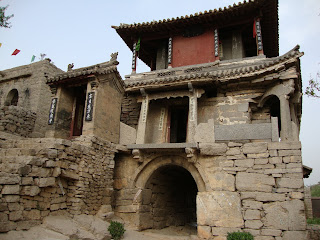
one of the main attractions in the town. This was a strange somewhat lopsided tower said to have been built about 500 years ago by a local eccentric. He was an amateur architect; the building has no foundation, is composed of all sizes and shapes of stones, and does not follow the traditional ideals of symmetry almost always found in classical Chinese architecture. The story goes that he wanted to build a tower tall enough to see Beijing from and built the entire thing himself refusing help of any kind, and built only by the light of the moon. Taking all that into account it was a pretty interesting building. Inside were lots of kitchy statues of Chinese gods which have been added more recently.

from below
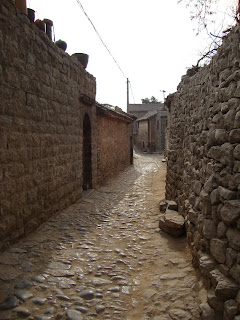
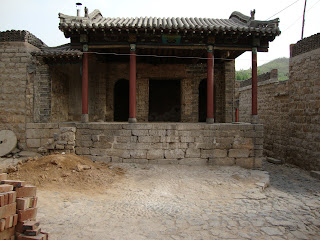
scattered throughout the town were old opera stages once used for open air performances.

detail of the painting over the stage

a small shrine in a wall
eventually we started to look for a place to stay. our guidebook simply said some locals rent out rooms for a small fee, so we started to ask around. people in the town were really nice. most of the residents seemed to be elderly, and a couple of times when we looked into an open courtyard they'd see us and invite us in to look around. one woman up some steps in a tiny temple pointed out all the different gods to us and then stood and chatted with us for 20 minutes. the dialect in the town was very difficult to understand and i think we were only getting about 30 percent of what she was saying, but she didn't seem to mind. she was very lively and laughed easily and had kind eyes. we asked her if she had children and she said she'd had two boys and a girl but they had all died. her husband had also had an accident and was either paralyzed from the waist down or had lost his legs. he had had to pull himself around on a little cart with his hands. it was hard to imagine what this woman's life had been like, living in this tiny village since she was 18 and all the changes that had happened in that time. i thought it must sometimes be strange for her to have these people arriving from so far away who have had such different lives. that's the strange side to being a tourist. there's this lurking feeling of guilt that i just can't shake so much of the time. i wanted to give her a hug for some reason, but people don't really hug in china, so we just smiled.
we asked a nice family running a shop about a place to stay and they helped us find the home of an elderly woman who rented out rooms in the home she'd lived in her entire life. It was possibly the best place I've ever stayed in in China. We took some photos and i also took a video of our room which i've posted a video of below. The room looked like it hadn't been touched in 40 years, except for the newer t.v, the dates on the calendars, and the colored photographs. Everything else seemed to be from a bygone era. It was actually two connected rooms and each room had a 'kang' which is a large bed that takes up much of the room made of the same material as the walls. underneath it is an oven and serves as the room's heat source while heating the bed from below. In the past whole families would share the kang at night and also spend much of their time on it using it as a living space during the cold days. I'd always wanted to sleep on one. it's warm out so the oven wasn't lit but it was still fun. (though basically had no padding, so it was kind of like sleeping on the floor).

this was the smaller room and the smaller of the beds


parts of the town were newer. there was a new school and this huge stage next to it. above the stage was painted 1984--maybe the year it was built. It had such an old china look to it. I was imagining the communist productions that would have been put on on that stage at one point in a very different china than the one that exists today.

the stage

we ate dinner in a little restaurant. i snapped a photo of our view of the kitchen. we ordered some spicy shredded potato and jiaozi (dumplings). we'd never ordered them by weight before, only number, and ended up with enough for five people.... we ate until we felt sick but still couldn't finish them

After dinner we walked down the the only road in the town. It was dark now and we could hear singing down the road. Earlier in the day we had seen a group of people down the hill standing around an old phonograph, playing a swelling orchestral song over and over again. It was epic and dirge like and echoed through the town. It's solemnity was undercut only by its repetition. Now it was dark and the music was not from a phonograph. A group of musicians had gathered where the phonograph had been. There was a keyboardist, a man playing the Er-Hu, another playing a guitar looking instrument with four strings, a few men clapping blocks or wood together for percussion and a pair of singing ladies. The ladies took turns singing. Sometimes they sang back and forth to each other. Sometimes they were silent. They performed old songs: folk opera. The melodies were in turn sad and comical. Piped through bullhorn speakers attached to the roof of a roadside shop, the music was incredibly loud. It shot straight out of the speakers and crashed into the high stone wall on the opposite side of the narrow road and then bounced back out and across the entire village. Goats watched from the high stone wall, looking down at the musicians. Occasionally the music would stop and the musicians would pass around cigarettes and sip beer from green bottles. We learned later that someone had recently died in the village and that the musicians had been hired to play as part of the funeral. They played late into the night. As the music--either the phonograph dirge or the live music--played nearly the whole time we spent in the villiage, it brings back the memory of the feeling of the village when i hear it now. There is a video posted at the bottom, but it is better for the sound than for the visuals. I think this type of chinese opera music is strangely wonderful.


back in our room
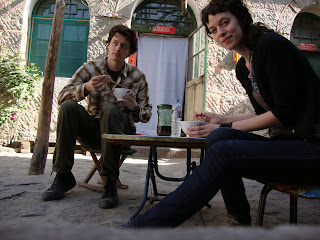
the woman whose home it was made us noodles for breakfast. Her granddaughter said her noodles were famous locally. I've never been able to get used to noodles for breakfast, but they were actually quite good. we sat in the courtyard to eat.
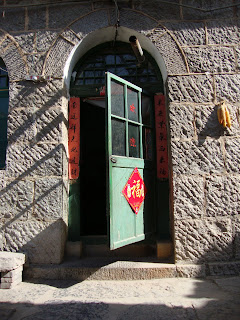
the doorway to our bedroom

you could go up on the roof of the house. here's the view down into the courtyard.

the house next door

the granddaughter is coming to beijing for college next fall and wanted to keep in touch with us. then we all took a photo together.
the way home seemed longish, crowded most of the way back over the bumpy roads in the minibus. An older woman standing near me started talking to us (her dialect was also hard to understand) and i wasn't sure what she was saying when she grabbed my hand and inspected it and laughed. she was quite intrigued about my skin color or maybe my long fingers. i don't know. but though personal contact with a stranger still seems a little strange to me i liked that she wasn't inhibited. some people are so shy around us when we get out of the bigger cities and i appreciated that she was basically just like, wow- you're really weird!
after the two busses we got to the train station but if we wanted to leave soon there was only standing room. we bought a tiny stool and on the train sat on that and a newspaper we spread on the ground, which is what most people do with standing tickets. it wasn't bad if you don't mind moving periodically for the mop women who come around. (it seems more their goal to make the floor wet rather than clean...) . So after three hours on the train we were back in beijing.

a town we stopped at to change busses on the way back to beijing. the two cooling towers were the main skyline. we took this photo from a bridge over the 'river'. it was just a dry riverbed with crops planted in it.




























